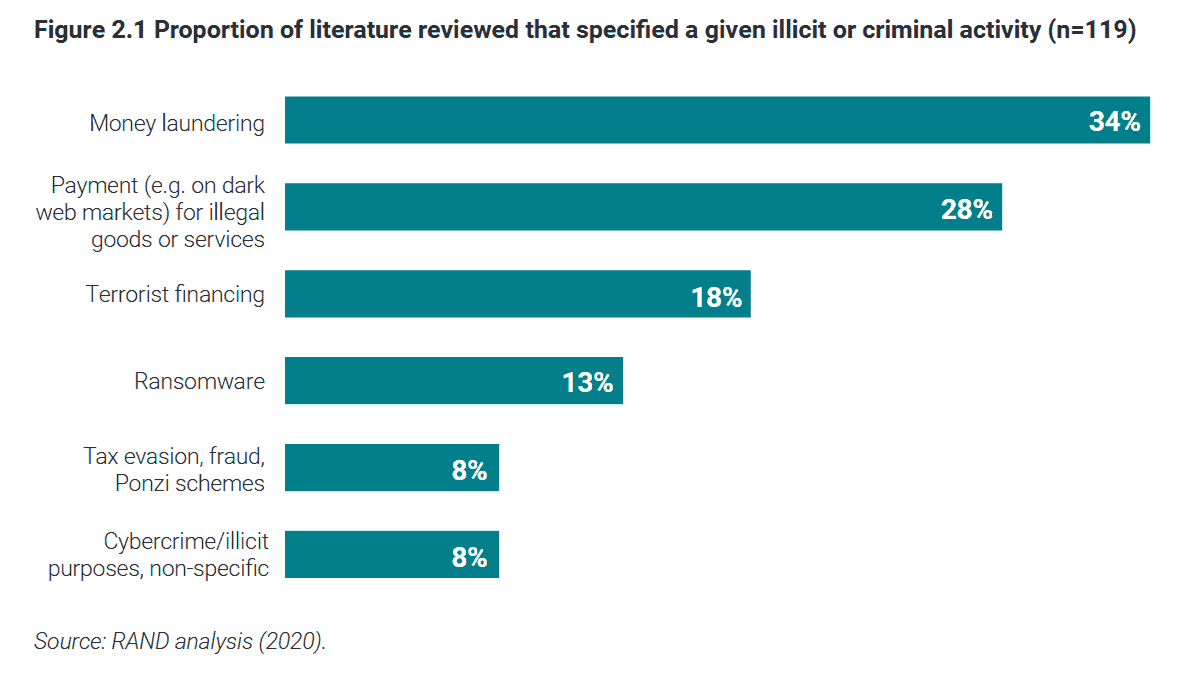Zcash (ZEC) was recently the subject of a research paper which aimed to explore the extent to which the privacy coin is used for illicit or criminal purposes.
Funded by Electric Coin Co.(ECC), the company behind Zcash, the analysis carried out by the RAND Corporation and concluded that Zcash was not regularly used for illegal means.
However, the critical findings offered up by RAND Corp are non-committal, vague, and incredibly illogical in light of Zcash’s status as an apparently untraceable privacy coin.

Absence of Evidence Does Not Equate to Evidence of Absence
The first of RAND Corp’s key findings reads:
-
“Zcash is relatively unknown in the academic research community, and the links between Zcash and illicit or criminal activities have not been substantially researched.”
In other words, the key discovery here is that no academic research can be found, which details Zcash’s use for illegal purposes – because no such literature exists. The researchers did find academic literature focused on the technical aspects of Zcash, particularly its privacy features.
The authors of the paper admit that this discovery amounts to little in terms of proof:
“Crucially, the absence of evidence does not equal evidence of absence, meaning that the fact that there is little proof that Zcash is used for illicit or criminal purposes does not mean it is not happening; rather, this activity is simply not being detected.”
The paper’s second key finding:
-
“This study found no evidence of widespread illicit use of Zcash.”
The authors state there are, “certainly some indications or anecdotal evidence,” that Zcash is being used illegally, but, “no evidence of widespread illicit use exists.”
Once again, the researchers at RAND are honest enough to admit that absence of evidence does not equal absence of evidence. So far, so…what?
Zcash Falling Behind Its Peers?
The third key finding in the paper by Silfversten, Favaro, et al. reads:
-
“Zcash has only a minor presence on the dark web.”
Examining dark web merchants to see which cryptocurrencies are used most often is a more tangible metric. According to the paper, Zcash has only a minor presence on dark web marketplaces, and is used less often than other coins, “particularly Bitcoin and Monero.”
In an analysis of crypto wallets used on dark web marketplaces, the findings showed that transparent Zcash wallets made up just 0.09% of the total. Shielded Zcash wallets made up 0.02% of the total. Bitcoin accounted for over 90%.
But according to RAND, the most common criminal activity associated, which utilizes cryptocurrency, is money laundering (seen below).

That leaves a giant gap in the already slim literature unless money launderers decide to start answering surveys. Not all crime using digital currencies take place via dark web marketplaces. While the dark web stats do provide some context, we are still left with another case of “absence of evidence”.
A fourth key finding:
-
“Users engaged in illicit activities may not fully understand the Zcash operating model.”
The report states users might not fully understand Zcash’s privacy features or perhaps aren’t aware of them. Two interviewees told RAND’s researchers that Zcash’s usability was deemed to be “falling behind its peers”.
Remarkably, the report even suggests criminals purposely avoid Zcash because they don’t believe in the effectiveness of its privacy features.
Some Questions
The paper asserts that ECC has attempted to rebrand Zcash to make it compatible with AML/CFT regulations. This may make ZEC seem less inviting to criminal elements, the authors speculate.
This, along with much of the paper’s findings, invites some obvious questions.
What exactly is Zcash, and does it fulfill its stated goals? Further, what are its goals? The RAND research seems to suggest Zcash is not fit for purpose as use as a privacy coin or is not deemed so among cryptocurrency’s criminal user base.
One the one hand, Zcash is supposed to be the second most popular privacy coin, at least by market cap (discounting Dash’s optional privacy). But judging by the tone of the report, the cryptocurrency which pioneered zk-SNARK’s is perhaps attempting to steer away from that label altogether.
And just how is any research group – even one from the military-founded RAND—supposed to uncover illegal transactions on a supposedly private blockchain? The scraps found in this report are mere nibbles, but then, why would we expect anything at all? What was the point of it?
On the same day the report was published, ECC released a blog post that sent out a rallying call for economic freedom. The post declared RAND’s research had judged that Zcash was not used by “bad actors” around the world, adding:
“But the conjecturers really don’t know why. It’s all just guesses.”
It’s all guesses on this end too.
Electric Coin Co. Responds
Electric Coin Co. were kind enough to offer a response to some of the questions posed above. Josh Swihart, VP of Growth at ECC told CryptoPotato that the report was commissioned to dispel the false notion that Zcash was used for illegal purposes. According to Swihart:
“ECC commissioned the report with RAND in support of conversations with regulators and due to misinformation previously reported that Zcash was being used for illegal purposes.”
Contrary to the opinions expressed in this piece, Swihart said the RAND report offered comprehensive proof that Zcash wasn’t being used for illicit means. Or at least, that there was little evidence to support the notion. Swihart said:
“The comprehensive quantitative and qualitative research shows that though Zcash is widely supported and consistently ranks in the top 10 coins for transactions and payments, there is little to no evidence people are using Zcash for illicit activity.”
But as the RAND report states over and over again: absence of evidence does not equate to evidence of absence.

The post Zcash ‘Criminal Research’ Paper Raises More Questions Than it Answers appeared first on CryptoPotato.
The post appeared first on CryptoPotato






